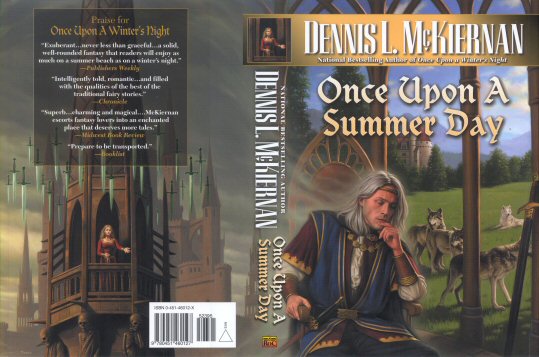

Are fairy tales but relics of altogether greater stories that once might have been told, pale remnants of much longer, even epic sagas? To me it seems a possibility. Oh, perhaps not all fairy tales are faint echoes of once-mighty shouts, but I think some of them surely must be. You see, what many contend is that most fairy tales are stories from way-back-when, tales that were orally passed from person to person, and so they were unadorned and short and rather easy to remember. And many of them simply were to entertain, while others had a point to be made, whether it be a moral or a truism.
Some of the most beloved stories, those most likely to be passed from folk to folk, were co-opted by religion, and the heroes and heroines were said to be part of a particular religious group, whereas the villains were part of the old order--witches, goblins, trolls, and the like. Hence, these tales were used by whatever religion seized upon them to foster good will or belief, or to recruit. And some of the tales were shortened again to do this, or so I do believe. But as I said in the foreword of another book (Once Upon a Winter's Night), back when bards and poets and minstrels and the like sat in castles or in hovels or in mansions or by campfires, or entertained patrons as they travelled along the way, surely the original tales were much longer when told by these "professional" storytellers, than the tellings of the less skilled. And so the bards embellished their tales with many more wondrous encounters than the later, altered--shortened--versions would have them be. After all, in the case of a bardic storyteller, she or he would hold audiences enthralled for long whiles with accounts of love and seduction and copious sex and bloody fights and knights and witches and dragons and ogres and giants and other fantastic beings all littering the landscape of the tale as the hero or heroine struggled on. And so, I believe it is entirely possible that many of these splendid bardic sagas were severely shortened as the number of bards dwindled, and the people who were left to remember and pass on the tales simply didn't have the oratory skills to tell stories of epic scope. And so they grew shorter and shorter over time as particular portions of a tale went missing bit by bit, until they were pared down to the point where practically anybody could tell the story.
For example, were some great bard to tell a grand and glorious tale of the scope of, say, The Iliad, or The Odyssey, or even The Lord of the Rings, and were any one of these orally passed down through the ages from person to person, and if those passing on the tale were "common" folk, I believe the story would have dwindled a bit with each telling. And then, if one far-after day some Grimm brothers decided to write the beloved story down as it had come to be told, it might turn out to be an eight-page fairy tale.
Yes, I admit that's quite extreme, but I simply use it to make a point: that oral tales are difficult to pass on unless they are simple and short and rather easy to recall, or unless the people involved have phenomenal memories.
Thank heavens for writing, eh?
Don't misunderstand me; I am not putting down the fairy tales we've all come to cherish. I love them dearly: from the simplest "Little Red Riding Hood" and "Goldilocks and the Three Bears" and other tellings I heard from my mother and grandmother, to the Andrew Lang collections--The Crimson Fairy Book, The Red Fairy Book, The Pink Fairy Book, and on through Orange, Yellow, Olive, Green, Lilac, Blue, Violet, Grey, and Brown: i.e., the spectrum--to the works of more modern writers, such as Dunsany and White and Tolkien (arguably, they were fairy-tale writers though their works are labeled fantasy these days), to some of the works of current writers.
What I am saying instead is I've always felt that many wonders were lost by what I think might be the shortening and altering of each age-old folk and fairy tale to fit a different song from that which the old bards and my Celtic ancestors would sing.
And so, a few years past, I wrote my first "restored" fairy tale (Once Upon a Winter's Night) to tell (in a traditional manner and style) one of the time-honored tales as I think it once might have been told. And now here I am again with Once Upon a Summer Day, my second "restored" fairy tale. And once more I have chosen a tale that not only is one of my favorites, but is a favorite of people around the world.
And since it is a romance in addition to being an adventure, once more you will find French words sprinkled throughout to represent the "Old Tongue."
By the bye, in my version of The Blue Fairy Book this story is but six pages long; the version of Brothers Grimm is even shorter and probably better known. I thought that much too brief, and, as is apparent, I did lengthen it a bit. But then again, I claim that I am telling the "real" story, and who is to say I am not?
Dennis L. McKiernan
Tucson, Arizona, 2005